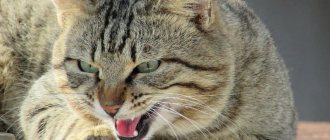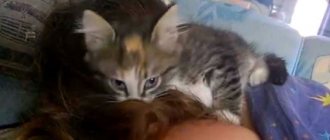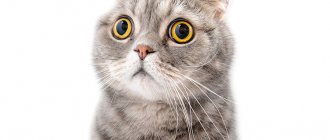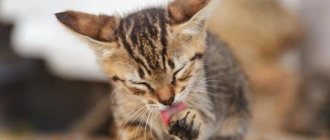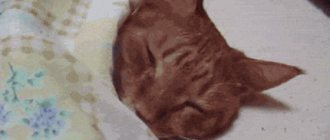Why does a cat lie down in the place where the owner slept?
Experts decided to dispel all the myths and conducted several experiments, after which they divided the behavior of cats into several different reasons:
- physiological reason;
- emotional;
- energy.
Speaking about physiology, it should be noted that a person’s head is always warm, so a pet is more comfortable there. The location of the cat near another part of the body may indicate that it is hot there and perhaps there is an inflammatory process, which in turn leads to fever. The cat will also be comfortable lying on a radiator or on a laptop, because these objects emit heat.
In a dream, a person does not swing his head, but a cat has probably already been accidentally hit with his foot or hand. The animal can remember that it is safe and comfortable to sleep near its owner’s head.
The next reason is emotional. A pet and its owner feel each other on a mental level, this cannot be explained, it must be understood. A person and a cat can become attached to each other, and when a pet lies down next to its owner's head, this is a sign that the animal adores its person.
The last reason concerns the energy component. The fact is that a cat is able to detect the slightest fluctuations in human energy. This is one of the reasons why a cat will lie down in the place where the least amount of negativity has accumulated. The animal takes on part of the load, which it must later process and return again for the rest of the negative.
Popular signs say: if a cat lies down, it’s not just like that. If there is always one place, then this indicates the development of pathology in the area where the cat is located. The pet constantly settles above the owner’s head - this is a signal of the latter’s chronic fatigue, increased nervousness and stress. It can also signal headaches and disruptions in cerebral circulation.
The cat is bored
If your cat doesn't get enough exercise, she will follow you around to pass the time. This is very evident among domestic cats who are unable to exercise their hunting instincts. This way, the cat will follow you around as a substitute for exercise.
Remember that cats are curious creatures, so if you are holding something, they will follow you until they find out what it is.
It is important to keep your cat occupied with toys and other activities. If you are going to work, it is better to leave interactive toys for your cat to play with.
Signs of a cat's rest
Recently, more and more different signs about representatives of the feline family in the bed of their owner have been popping up on the Internet. Until now, experts continue to argue about why pets do this, but there are several plausible assumptions:
- Pets are designed in such a way that they have very strong energy, so they can easily find pain points on the human body and begin to heal them. If the owner has a headache, then for this reason the animal can lie down in the area of the head and try to “cure it.”
- an independent cat who has chosen a certain person as her owner believes that this person is a stronghold of security for her, so she lies down on his pillow or head and finds a calm place;
- if a pet sleeps in its owner’s bed, it shows its love and devotion;
- cats are extremely heat-loving animals; they are constantly looking for a warm place in the house. One of the sources of heat is a person, so it is logical that a pet is looking for a place near its owner.
The cat loves you so much
Each cat has its own way of showing its affection to its owners. Some of them are quite intrusive, they will follow you around. Domestic cats often enjoy spending time with their families, often following their loved one around the house.
Your cat shows affection towards you by constantly keeping you company. This means that she will follow you wherever you go, including the bathroom. Just imagine children following their mother into the bathroom - the same with cats, especially kittens.
Although your cat may appear aloof and independent, she will tend to soften and become more sociable over time. Additionally, a sudden change in your home can cause your cat to become clingy.
Why does a cat take the owner's place?
If a cat lives in the house, then its owner cannot help but notice some peculiarities in the behavior of his animal. Cats and cats can surprise; they give rise to a lot of questions and superstitions. If a person is about to sit down on a chair, then the cat is right there. The pet jumps onto the chair right in front of the owner's nose.
It seems that the pet is doing this on purpose, as if he wants to demonstrate his leadership and audacity. The owner at this moment usually adjusts and does not interfere. However, the situation is somewhat different. The cat tries to take exactly the place of the owner, since the elusive smell of a person remains there. Cats have a keen sense of smell.
The pet expresses the mood to be close to its owner. The same thing happens when a cat goes to sleep on its owner's clothes.
After the owner gets up from the chair, the seat retains heat for some time. A soft, warm chair that also retains its owner's scent is a great place to sleep. If a feline jumps onto a chair before the owner sits down, this is a sign that the pet is attracting attention. You need to try to give the animal some of your time, communicate, scratch the cat behind the ear.
Attract attention
When a cat rubs against your legs, it is asking for attention and affection. Sometimes the request is so intense that it is impossible to stand on your feet. If your pet is of impressive size, it is best to continue communication while sitting in a chair. However, you cannot always afford to give your pet the attention it needs.
Those who go to work for the whole day know that upon their return an incredibly missed creature is waiting for them at home. And until you feed and scratch behind the ears, they are unlikely to leave you alone. Perhaps due to these behavioral qualities, cats are often companions of lonely people. Thus, a person himself receives a dose of love, which for some reason he cannot receive from his own kind.
How to prevent your cat from stealing your seat?
There are times when you want to prevent your cat from sitting on your chair at all. Perhaps your chair is new, or, for example, you have guests. Cats are attracted to furniture, especially if your scent is on it. However, you can make your furniture less attractive by doing the following:
Don't let your cat sit
You can prevent your cat from jumping on your seat by placing something on it every time you stand up. This could be a blanket that you know your cat doesn't like, or anything else that will block your scent and prevent your cat from getting comfortable. At first you may think that you are being mean, but the cat will learn that your place is off-limits.
Provide an alternative place for your cat
If you provide your cat with a more comfortable and better located place, she will be more likely to leave your place alone. Your cat may be happy with a suitable cat bed or a cozy place you make for her.
To encourage your cat to move to a new place, place a blanket or clothes with your scent on it. Cats that want to approach your scent or mark their territory will be attracted to your pheromones and will likely allow you to take their place.
We recommend viewing
Why do cats change their sleeping places? Why do cats act strange when you scratch the base of their tail? How to keep cats away from bird feeders
Likewise, if a cat realizes that stealing your space will give her the opportunity to cuddle with you, she will do so to get closer to you, not only for the sake of affection, but also for the warmth of your body.
Some cats also see this as a fun game and will jump on your chair to start the game. If your chair is made of soft fabric, be careful when playing with your cat, as its claws can make holes and pull threads out of the material.
Feels safe
Sitting in your chair, you personally marked it as safe. Thus, cats see that this resting place is reliably protected, and they go to bed, knowing that nothing threatens them.
This comes from a time when cats were wild and needed protection from predators. Although cats are primarily predators, injured, vulnerable or small cats become easy prey for larger animals.
So when your cat jumps up on your seat, it really is a compliment. Your pet feels safe enough to let his guard down, knowing that he is protected without fear of a surprise attack. Your cat is part of your family pack, and she feels that way.
Your cat feels safe next to you.
Cats, especially kittens, will feel insecure in a new home. And if they made you their mother, they will follow their owner around to feel safe. Even adult felines will exhibit this mother-child relationship.
Additionally, cats will become confused and anxious if you lock yourself in a room. If your cat meows endlessly until you let her in, it's a sign that she wants to be with you. This is to ensure that you are safe and don't go anywhere.
Cats that are weaned early tend to be overly dependent on humans. It is important to socialize your cat so that she does not become overly clingy.
Moreover, cats will often follow you everywhere at night so they can snuggle up to your bed. In the wild, cats sleep near other cats so they are less vulnerable to potential predators.
© shutterstock
Why does my cat jump into my chair when I get up?
Cats love to snuggle up in a soft, comfortable chair, but it can be very uncomfortable when they decide that your chair is what they want. Most owners cannot accept the fact that their happy cats will leave their new sleeping place and move to another place. Why are cats so eager to jump on your chair as soon as you change seats?
The chair is warm
According to the Journal of Physiology, cats can respond to differences between warm and cool temperatures. A cat's paws are sensitive to temperature changes.
As descendants of the African wildcat, cats crave warmth. The average body temperature of cats is 102 degrees Fahrenheit, while that of humans is 97.5 degrees. Most domestic cats are adapted to warmer climates. Those cats that live in colder areas develop thick, fluffy fur to survive, which traps heat and keeps them warm.
However, most domestic cats rely on external heat sources to stay warm, which they sometimes receive through our body heat. Because heat transfers from our body to the seat after sitting for a long time, cats sense the warmth and move there to take advantage of it.
Interestingly, since a cat's fur has insulating properties, it can prevent the animal from realizing that it is too hot. Since our body heat dissipates very quickly from the seat, this will not cause a problem.
Territory marking
Cats produce many different scents to convey messages to other animals. They also find their own scent soothing. The cat will jump on your seat to leave its scent, which will make the smell of the chair more familiar and the environment more comfortable.
If you have other cats in the house, this process shows dominance and allows the cat to mark its territory to alert all other animals.
The cat may also take your place over and over again. While it can be frustrating, if you're comfortable, don't take it personally. Your cat is occupying your chair because she is reusing her scent as it fades. Cats like to know that their scent is present, even if they are in another part of the house.
Also, don't be surprised if your cat sits in a new place for a long time without moving. Cats spend a significant amount of time in one place to make sure it smells like them. If you sit there longer, the smell will be stronger.
Chasing your scent
Cats rely on their sense of smell, which is approximately 14 times stronger than that of humans. In addition, cats have 200 million olfactory receptors that detect odors that we cannot detect. Your scent can help your cat feel comfortable and relaxed, and many cats enjoy being around the scent of their owners.
Cats also have a dual sense of smell. It consists of normal olfactory receptors that detect odors in the air. There is also a second nose called the vomeronasal organ, otherwise known as Jacobson's organ. This organ detects pheromone signatures that most other animals cannot detect.
According to Oncoscience, a cat's well-developed olfactory bulb also contributes to a heightened sense of smell. These pheromones allow cats to recognize their owners. When the owner moves from his place, the cat easily detects these unique pheromones and sits in the same place, closer to the soothing smell.
Wants a reaction
Cheeky cats love to push boundaries and will stop at nothing to get your attention. If you give a positive response in the form of petting and cuddling after your cat steals your space, she will remember this and try to take your place more often.




